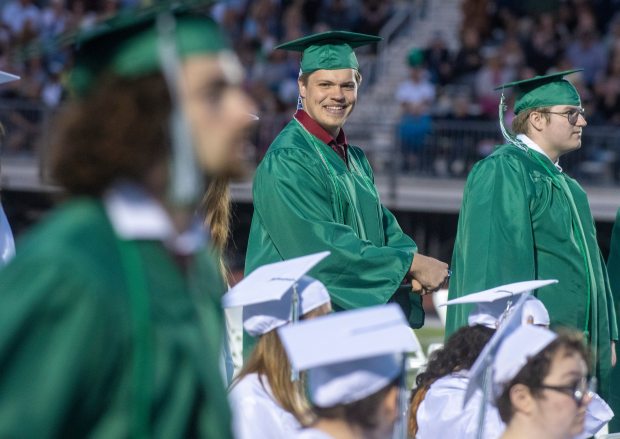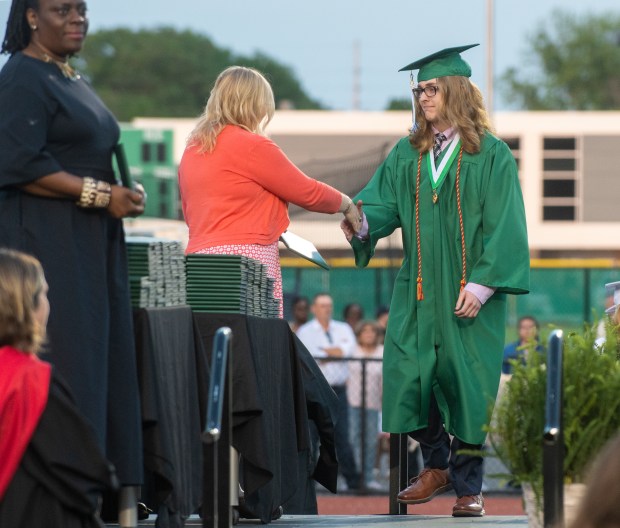Opposition is intensifying to an Indiana Department of Education redesign of Indiana’s high school diploma that critics say reduces academic rigor in favor of work experiences.
The proposal eliminates the state’s Academic Honors diploma, a popular track geared to students heading to postsecondary education. According to state data, about 22,000 students received the more challenging diploma last year.
The changes stem from a law passed by the General Assembly this year calling for an update to the state’s diploma requirements approved more than 10 years ago. The new requirements take effect with the Class of 2029.
Today, most students earn the Core 40 diploma, the Core 40 with academic honors or technical honors. Those designations would disappear after 2028. Incoming eighth graders this year will make up the Class of 2029, the first ones impacted by the new diploma.
Rep. Robert Behning, R-Indianapolis, chairman of the House Education Committee, called for the changes in House Bill 1243, but left it to the State Board of Education and Department of Education to draw up specific requirements. The law has a Dec. 31 deadline for the changes.
The diploma revamp was rolled into a 75-page “various education matters,” measure passed with little opposition in both chambers.
The House passed it 96-0.
As the Department of Education’s proposal began emerging, educators, parents and students became alarmed at the loss of the honors track.
Last month, seven state universities sent letters to state education leaders critical of the new diploma draft.
“The proposed GPS and GPS+ diplomas do not meet Purdue admission requirements in the subject areas of math, lab sciences, social studies and world language,” said Purdue University President Mung Chiang who added the new diplomas don’t require students to take the SAT or ACT to graduate. Chiang said students who earned the academic honors diploma performed better at Purdue than students who earned the Core 40 with technical honors diploma.

Aaron C. Trump, vice president for government affairs and general counsel at the University of Southern Indiana, criticized the workforce emphasis, saying it received priority “rather than aiming to provide all students with the necessary education and skills to access pathways to multiple opportunities, and ultimately be successful in all.”
He said committing to a certain pathway appears to reduce opportunities and remove the flexibility sought by the state.
“This may actually result in fewer successful outcomes,” he said.
Several Indiana lawmakers and school board members opposed the changes at Tuesday’s public hearing, which marked the end of the initial draft period.
Rep. Earl Harris, D-East Chicago, said he’s unclear on how the new diploma proposal came together.
“I’ve asked that question. I wish I had a definitive answer,” he said. He said the bill wasn’t intended to overhaul the diploma process.
He said the diploma changes have been the chief topic at Indiana Black Leadership Caucus town hall meetings this summer. The next one is Aug. 17 in Gary at Indiana University Northwest.
Regarding the internship work experience requirement, Harris said there were no answers on how transportation would be handled or how liability issues would work, if a student was injured. He said it’s unclear if there would be background checks at work sites for employees working with children.
“Parents certainly do not want their children to be forced into a potentially unsafe situation,” he said.
In addition, he said students would have difficulty getting into college.
“These new diploma requirements would make it almost impossible for a student to even be considered by an Indiana college,” Harris said.
Harris said a family member has already said if the diploma requirements remain, it will be the determining factor on staying in Indiana. “The brain drain will have an impact on the economy. It really is a big negative,” he said.
School Town of Munster Superintendent Bret Heller said the diploma timeline should be delayed. He said schools would face staffing issues, leaving teachers and students unprepared.
He also wanted the academic honors diploma to be maintained as an option.
“I know that I speak for many of my colleagues when I say that we believe that retaining this option provides the very flexibility that has been spoken of throughout this high school redesign process. Removing this option does not increase flexibility, it decreases flexibility.”
Rep. Mike Andrade, D-Munster, said the new proposal reduces academic requirements, fails to meet standards for college admissions and overlooks the needs of students with disabilities.
“The changes undermine students’ readiness for higher education and limit their exposure to a well-rounded curriculum, compromising their future career opportunities,” said Andrade.
Lake Central Superintendent Larry Veracco said in an email the academic honors diploma works for students who go to college without the need for remediation and finish with high graduation rates.
“The IDOE and State Board of Education are losing the messaging battle with switching to the GPS models,” he said.
The new diploma plan does have merit for the segment of students who seek employment after high school, he said.
Union Township Superintendent John Hunter said the school board discussed the diploma changes at a recent school board meeting and comments were encouraged from residents.
“We believe the new requirements will be good for some of our students. We do not believe they are the best option for our post-secondary students and fear colleges and universities may not accept students on that track,” he said.
State Sen. Rodney Pol, D-Chesterton, voted against the final conference report on the bill.
“There really were no guardrails about what could be done about changing the curriculum… Obviously, we didn’t know to what extent the Department of Education was going to take it.”
Pol said local students who are part of his student advisory committee all knew about the diploma changes.
“They were all versed in it,” he said, especially the downgrade of world history. “That stuck in their craw,” he said.
Pol said lawmakers haven’t been updated on reasons for the changes, including the elimination of geometry and Algebra 2 as requirements.
“It’s insane. It’s such a wild change,” Pol said.
“How are educators supposed to adjust to this? This is such a jarring change and movement from what is considered our core values.”
Pol said the changes have blindsided both GOP and Democratic lawmakers who could opt to pause implementation.
GlenEva Dunham, president of the Indiana Federation of Teachers and the Gary Teachers Union, said she hopes lawmakers review the changes and listen to the voices of the university presidents.
She said the union was sending emails voicing concerns to legislators and State Board of Education members.
She expects more information at the state board’s Aug. 14 meeting in Indianapolis.
A second draft of the diploma rule will be shared later this summer, followed by a second round of public comment.
Carole Carlson is a freelance reporter for the Post-Tribune.


